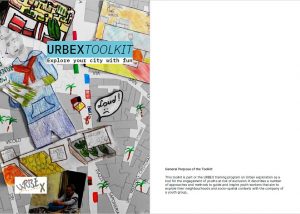Youth are the future and without engaging with them, their potential to become leaders and advocates for positive change in their communities could be lost. In recent times, it has been argued that young people in urban communities are less likely to take part in civic engagement activities, resulting in both youth and society missing out on the potential benefits. Mapping for Change is teaming up with several partners in Europe to tackle this issue with project Urbex.
Background
Urbex is a 12 month Erasmus+ funded project which used urban exploration as an innovative way to engage young people at risk of social exclusion and encourage their participation in civic issues.
Mapping for Change joined four other partners Bond of Union, Dramblys, Tesserae, Prostorož , each bringing a wealth and variety of experience in the field of participatory urban exploration to the project. We shared good practices and created exciting new methods and tools that we trialled in disadvantaged urban neighbourhoods across Europe.
The Project
The project focused on two particular demographics identified by the project partners:
- 50 young people (16-24 years old) living in the neighbourhoods where the project partners work (10 for each local context)
- 25 youth workers/educators of the partner organisations and other professionals interested in the use of urban exploration as an educational tool (5 for each partner)
Both groups were directly involved in the project, spending time together in Palermo to learn the different approaches and applications of urban exploration. The groups gained knowledge, confidence and skills from this process; from the project partners; and from each other.
The Partners
Each partner organisation worked in a specific pilot neighbourhood to test and deliver these practices. The pilot cities involved were Albacete, Berlin, Ljubljana, London and Palermo. In order to gain maximum reach and be meaningful for participants, we tied-in project Urbex with existing projects and consultations happening in the neighbourhoods.
The outputs
- A summary of the project activities and deployment can be found in this blog post and the project newsletters (project newsletter 1 and project newsletter 2).
- Both individually in our local contexts and together in Palermo, the project partners tested and refined tools, approaches and methods that were put in a toolkit. This is a document that all other agencies and organisations working with disadvantaged young people can use to increase their participation in civic society.

- A picture is worth a thousand words but a video can be even more inspiring! Watch the testimonies and experiences of the young people who took part in the exchange in Palermo in April 2019.
Related Projects
InSPIRES
InSPIRES is a EU-funded project which aims to address the information gap that vulnerable demographics can hold about the impact that air pollution has on their health. Mapping for Change works with a school in London, whereby parents and pupils will have the opportunity to monitor particulate matter and nitrogen dioxide pollution levels in and around their homes.
Kampala NOSES; Network for Odour Sensing Empowerment and Sustainability.
Kampala NOSES is a pilot project that seeks to introduce novel ways with which to monitor and record odour issues across Kampala. All key stakeholders, from policy-makers to public sector administrators, from academics to industries and the community at large are needed to create a longer-term vision of implementing new environmental reporting and governance mechanisms.
Active CiTizenship and Social Housing (ACtS)
As part of the European Commission’s Lifelong Learning Programme, Mapping for Change were chosen to represent the UK in a learning exchange project with the University of Udine (Italy) and the University of Oulu (Finland).